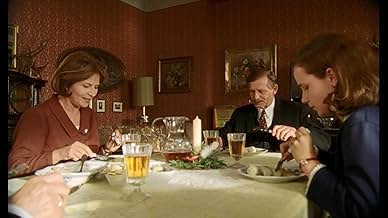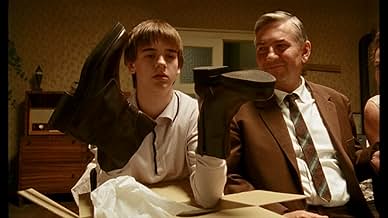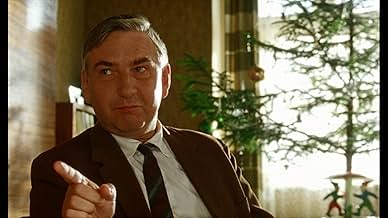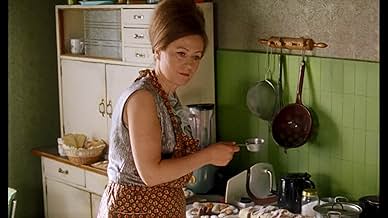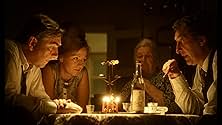Pelísky
- 1999
- 1h 55min
VALUTAZIONE IMDb
8,1/10
6657
LA TUA VALUTAZIONE
Aggiungi una trama nella tua linguaTwo families, Sebkovi and Krausovi, are celebrating Christmas, but not everyone is in a good mood. Teenage kids think their fathers are totally stupid; fathers are sure their children are no... Leggi tuttoTwo families, Sebkovi and Krausovi, are celebrating Christmas, but not everyone is in a good mood. Teenage kids think their fathers are totally stupid; fathers are sure their children are nothing more than rebels, hating anything they say.Two families, Sebkovi and Krausovi, are celebrating Christmas, but not everyone is in a good mood. Teenage kids think their fathers are totally stupid; fathers are sure their children are nothing more than rebels, hating anything they say.
- Regia
- Sceneggiatura
- Star
- Premi
- 8 vittorie e 8 candidature totali
Marek Javorský
- Péta
- (as Marek Morvai Javorský)
Recensioni in evidenza
10jerzym
In last few days I've made my own home festival of Czech movies. Today in cue was Hrebejk's "Pelisky". Some times ago I've watched his Musime Si Pomahat so I expect great film. But today's movie touched me very deep, reminding some moments from my life. I was born in 1952 so in 1968 I was in same age as young characters of the movie. In august I was on my holidays in the little town in south Poland where my granny lived - just about 150 km from the border of Czechoslovakia. For the rest of my life I will remember the sound of the soviet warplanes heard 20/21 August. I've been watching this movie with the tears in my eyes. I knew all the songs from the CSR big-beat groups because in 1967/68 I've everyday listen the Stanice Hviezda from Ostrava - 80 km from my home town. Really, really great movie. Understandable not only for the Czech & Slovak people.
I really enjoyed watching this movie. I found this gem by accident and I'm surprised that it hasn't found it's way to a major audience here in Germany although quite a few Czech movies run on public television. The movie is funny and witty but at times also sad and deadly serious. Like many other Czech movies the story is made up of small parts that fit together as a whole picture. There's the stubborn army officer a convinced communist and his family, there's the war hero that strongly opposes the communist regime a choleric and his family and the single teacher and her son who try to find a new man for the family and there are the teenagers of those families that don't really care about politics or what their parents think is important. Those are the main characters that form a whole picture of life in Czechoslovakia during the Prague spring in 1968. The stories switch at easy from funny to hilarious to sad and back. I recommend this movie to everyone to watch. It is certainly worth the time. Other reviews state that you have to be Czech to fully understand everything. Well, I could relate to the characters as well though I might have missed a cultural reference or two.
Cosy Dens (1999) is the ironic name given to the film that was called Pelísky in Czech. The movie was directed by Jan Hrebejk.
Two families are celebrating Christmas in the same apartment house during the Prague Spring. The father of one family is patriotic and anti-Russian. The father of the other is an army officer, and pro-Russian. The basic plot revolves around the relationships between these families. Clearly, the families symbolize two aspects of Czech society in 1968--some refused to accept the Soviet occupation, and denounced it when they could. Others turned the occupation to their advantage.
The movie has several plot threads. The two fathers argue constantly. The young son of one family loves the daughter of the other. (It's not Romeo and Juliet--his love is unrequited.) An aunt hopes to find a husband, but her son and her bad luck get in the way.
It's interesting that even the army officer's family celebrate with a traditional Christmas. It's very interesting--at least to a non-Czech--that the families keep a live carp in the bathtub, which is apparently a traditional aspect of the Czech Christmas.
The film is not just a comedy. It is a symbolic representation of the tensions of the Czech people, who must adapt to the fact that Russia controls their destiny. They don't know--but we know--that the Prague Spring will come to an end not through liberation, but through the roar of the Warsaw Pact tanks rolling through Prague.
There's a long shot of birds in a cage near the end. The presenter of the film made the symbolism clear. The birds have enough food and water to survive, but the central fact of their existence--like that of the Czechs--is that they are not free.
Seen as part of the outstanding Alan Lutkus International Film Series at SUNY Geneseo. The film is on DVD, and was projected onto the large screen. It will work on the small screen as well.
Two families are celebrating Christmas in the same apartment house during the Prague Spring. The father of one family is patriotic and anti-Russian. The father of the other is an army officer, and pro-Russian. The basic plot revolves around the relationships between these families. Clearly, the families symbolize two aspects of Czech society in 1968--some refused to accept the Soviet occupation, and denounced it when they could. Others turned the occupation to their advantage.
The movie has several plot threads. The two fathers argue constantly. The young son of one family loves the daughter of the other. (It's not Romeo and Juliet--his love is unrequited.) An aunt hopes to find a husband, but her son and her bad luck get in the way.
It's interesting that even the army officer's family celebrate with a traditional Christmas. It's very interesting--at least to a non-Czech--that the families keep a live carp in the bathtub, which is apparently a traditional aspect of the Czech Christmas.
The film is not just a comedy. It is a symbolic representation of the tensions of the Czech people, who must adapt to the fact that Russia controls their destiny. They don't know--but we know--that the Prague Spring will come to an end not through liberation, but through the roar of the Warsaw Pact tanks rolling through Prague.
There's a long shot of birds in a cage near the end. The presenter of the film made the symbolism clear. The birds have enough food and water to survive, but the central fact of their existence--like that of the Czechs--is that they are not free.
Seen as part of the outstanding Alan Lutkus International Film Series at SUNY Geneseo. The film is on DVD, and was projected onto the large screen. It will work on the small screen as well.
A beautifully understated story of ordinary people living their everyday lives through the trying times of Christmas '67 and the Prague Spring during the run up to the Soviet invasion. While the setting has be caught with stark and depressing realism, the film is perfectly balanced with a gently comic and bittersweet observation of the families and their relationships as they struggle through events from the mundane to the tragic. Personal loss, both of freedom and of loved ones, and the way life still manages to go on has been captured with deceptive ease and without resorting to the usual cliches and predictable attempts at closure that so often seem to pollute western cinema of this type.
10lk1918
Now THAT is a Czech film. While Kolja, a 1996 Czech film was specifically edited by the British co-producers to strip it of some very Czech elements which were culturally hard to understand for foreign audiences, this one is the real thing. Figures that while Kolja was showered with foreign prizes incl. the Oscar, this one got nothing significant abroad as far as I am aware. No matter, this is a seriously funny and sad film which will tell you a lot about the Czech sense of humour. Many passages sadly won't be that accessible without knowing the culture and history well, and inevitably, lots gets lost in translation, but you may still find it satisfying.
Lo sapevi?
- QuizMost of the jokes used in the movie are based on Czech writer Petr Sabach's book "Hovno hori" ("Shit burns"). The book consists of various unconnected stories.
- BlooperWhen Elien receives the package from America, it has three stamps affixed totaling only 8 cents. Notwithstanding that this is a paltry amount of postage to send a heavy package abroad, the three stamps had not been yet issued in America in December 1967. (The green Jefferson stamps were issued January 1968 and the larger Eisenhower stamp not until 1969)
- ConnessioniFeatured in Kovy: Vsehochut #1 (2016)
I più visti
Accedi per valutare e creare un elenco di titoli salvati per ottenere consigli personalizzati
- How long is Cosy Dens?Powered by Alexa
Dettagli
Botteghino
- Lordo in tutto il mondo
- 2.227.953 USD
- Tempo di esecuzione1 ora 55 minuti
- Colore
- Mix di suoni
- Proporzioni
- 1.66 : 1
Contribuisci a questa pagina
Suggerisci una modifica o aggiungi i contenuti mancanti


